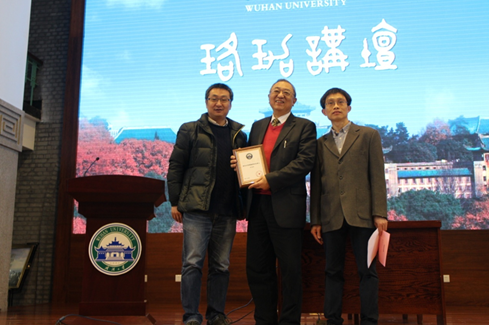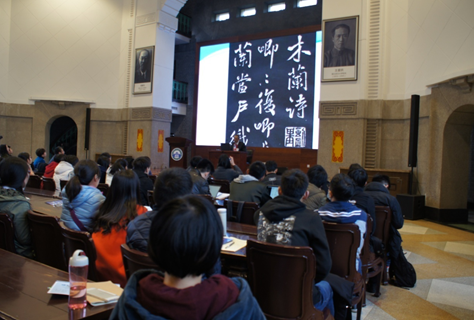On March 24th, the 166th Luojia Lecture was held in the old library. Professor Cheng Pei-kai from City University of Hong Kong (CUHK) delivered his speech on Chinese calligraphy appreciation and Chinese cultural innovation. Prof. Yu Ting, vice dean of the College of Chinese Language and Literature, awarded Prof. Cheng with the honorary title of Luojia Lecturer and a commemorative certificate. Prof. Cheng Yun hosted the lecture.

The award ceremony(from left to right: Prof. Yu Ting, Prof. Cheng Pei-Kai and Prof. Cheng Yun)
At the beginning of his speech, Prof. Cheng Pei-Kai stated that although he majored in Western literature, he was very intrigued by the time-honored traditional Chinese culture. One of his academic focuses was to compare Chinese culture with Western culture, finding out the differences and similarities between them.
In spite of his achievements in calligraphy, Prof. Cheng preferred to call himself a penman instead of a calligrapher. He encourages today’s youngsters to do more handwriting despite the rapid development of typewriting which seemed to be more convenient and efficient. “The single character or letter of alphabetical languages such as English and French only fulfills the auditory function, but Chinese characters are ideograms full of visual expression. Therefore, unlike those meaningless letters, they have their own artistry.”

Prof. Cheng appreciating calligraphy work
When it comes to cultural innovation and development, Prof. Cheng emphasized the connections between each field. “There are two Western scholars that influenced me deeply.” Said Prof. Cheng. “The first one is the French scholar Pierre Bourdieu who majored in history and sociology.” According to Cheng, Bourdieu highlighted the concept of “fields”. Art, literature, and economics were different fields that constantly interact with each other. The second scholar he mentioned was Stephen Greenblatt from Harvard. Greenblatt said that cultural innovation is based on historical tradition. His excellent research on the Renaissance and Shakespeare has proved that cultural innovation is a solid improvement only if every field interacts and cooperates with each other perfectly. If the creation is isolated from the world, it cannot actually be considered “innovation”.
Prof. Cheng also mentioned the similarities between the cultural development in Hong Kong and Taiwan in the 1960s. Both Hong Kong and Taiwan went through a rapid and positive cultural development during that period, and they also encountered similar obstacles. In Taiwan, Chinese culture was preserved very well at that time, but the pan-politicization trend has become a big problem in the last two decades. In Hong Kong, despite the British colonial rule, people there still managed to preserve our culture and history, which was more of a spontaneously motivated movement. Yet just like Taiwan, Hong Kong is also influenced by pan-political culture now. The examples of Hong Kong and Taiwan in the 1960s provide us with a referential approach. It suggests that in terms of cultural preservation, pan-politicization is a dangerous trend which should not be neglected.
As the director and professor of the Chinese Civilization Centre, CUHK (from July 1998 to 2013), Prof. Cheng Pei-kai is a famous cultural historian and poet. He is a famous expert on Chinese cultural history, Chinese cultural aesthetics, Ming-Qing artistic consciousness, historicity of Chinese drama and films, Chinese export porcelain and maritime trade.
The Luojia Lecture, named after the WHU landmark, Luojia Hill, was established during the 115th anniversary ceremony of WHU. It is a high-level academic lecture mainly held in the lecture hall of the Sakura Castle Library. The Luojia Lecture is devoted to inviting world-class scholars, including Nobel Prize laureates, to share wisdom with students through the art of speech. It has become a key activity in WHU within the field of humanities and social sciences.
Photo by Luojia Lecture
Edited by Wu Siying, Edmund Wai Man Lai & Hu Sijia


